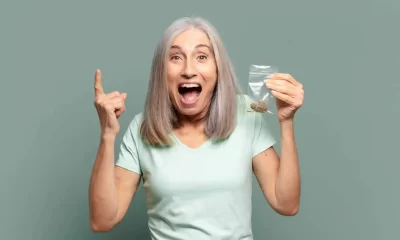Lifestyle
Study Shows Cannabis Use Could Lead to Increased Kindness and Empathy

Hearkening back to the more positive stoner stereotypes of years past, referencing the “chill vibes” and gentle nature of many cannabis users, a new study found that pot use may make people kinder and more empathetic.
Led by researchers for The University of New Mexico, the study was published in the journal Scientific Reports. It is one of the first to demonstrate the non-medical benefits of cannabis use and positive psychological outcomes among healthy young adults.
Researchers point to the existing literature surrounding cannabis and user effects, noting that the majority focus on the health risks and pharmacodynamics of consumption, rather than investigating other normative psychological effects of use among otherwise healthy people.
“Most investigations on the effects of using cannabis have focused on either negative consequences of cannabis addiction or on the physical health effects of cannabis use,” said Jacob Miguel Vigil, lead investigator and assistant professor at UNM Department of Psychology. “Almost no formal scientific attention has been devoted to understanding other psychological and behavioral effects of consuming the plant, despite it being so widely used throughout human history.”
With controls for the participant’s age, sex, ethnicity, and childhood socioeconomic status, researchers examined 146 healthy college students between 18 and 25 years of age with varying, detectable levels of THC in their urine.
Ultimately, they found that cannabis consumers scored higher than THC-free participants on measures of prosocial behavior, empathy, moral harmlessness, and moral fairness. Cannabis users and non-users had no differences in measurements of anger, hostility, trust of others, facial threat interpretation, extraversion, conscientiousness, emotional stability, openness, or moral decision making founded on principles of respecting authority and preserving the concept of purity.
The findings also suggest that cannabis could contribute to a shift from more ego-centric self-concepts to a heightened sense of selflessness and responsibility to protect others from unneeded harm. Among men, cannabis users scored higher on “agreeableness,” and most of the observed differences in prosociality between cannabis users and non-users had a correlation with the duration of time since participants last used cannabis.
This suggests that the effects of cannabis in this regard are transient; essentially, if you stop consuming cannabis, that extra boost of kindness could vanish.
“The transience of the effects supports that cannabis is triggering behavioral and perceptual changes rather than that cannabis users and non-user differ fundamentally in their baseline approaches to social interactions,” said co-author and Associate Professor Sarah Stith, UNM Department of Economics.
Co-author Tiphanie Chanel called the research “groundbreaking,” adding, “I hope that this work can help pave the road to more fully explore the effects of cannabis on human interactions and wellbeing.”
Studies show that people develop their personalities during adolescence and young adulthood, when prosocial behaviors and habits are formed. Researchers said that there is a need for further basic, psychological research in these age groups, especially among cannabis users outside of the study sample.
The cross-sectional model of the study didn’t enable researchers to track participants over time, particularly pre- and post-cannabis use. When discussing limitations, researchers also noted that the sample in this study was fairly small and may not be representative of the larger community, effectively limiting the generalizability of the findings. While the sample pulled from a university with a larger proportion of non-traditional students, and more ethnic and racial diversity, they note the lack of non-college students is still limiting.
Where there is still more to explore, Vigil refers to cannabis as a “super medication,” not only effective for treating an array of health conditions but now displaying potential to improve a person’s psychological health.
Vigil added, “Prosociality is essential to society’s overall cohesiveness and vitality, and therefore, cannabis’ effects on our interpersonal interactions may eventually prove to be even more important to societal wellbeing than its medicinal effects.”
Source: https://hightimes.com/study/study-shows-cannabis-use-could-lead-to-increased-kindness-and-empathy/
Business
Alabama to make another attempt Dec. 1 to award medical cannabis licenses

Alabama regulators are targeting Dec. 1 to award the first batch of medical cannabis business licenses after the agency’s first two attempts were scrapped because of scoring errors and litigation.
The first licenses will be awarded to individual cultivators, delivery providers, processors, dispensaries and state testing labs, according to the Alabama Medical Cannabis Commission (AMCC).
Then, on Dec. 12, the AMCC will award licenses for vertically integrated operations, a designation set primarily for multistate operators.
Licenses are expected to be handed out 28 days after they have been awarded, so MMJ production could begin in early January, according to the Alabama Daily News.
That means MMJ products could be available for patients around early March, an AMCC spokesperson told the media outlet.
Regulators initially awarded 21 business licenses in June, only to void them after applicants alleged inconsistencies with how the applications were scored.
Then, in August, the state awarded 24 different licenses – 19 went to June recipients – only to reverse themselves again and scratch those licenses after spurned applicants filed lawsuits.
A state judge dismissed a lawsuit filed by Chicago-based MSO Verano Holdings Corp., but another lawsuit is pending.
Source: https://mjbizdaily.com/alabama-plans-to-award-medical-cannabis-licenses-dec-1/
Business
Pot Odor Does Not Justify Probable Cause for Vehicle Searches, Minnesota Court Affirms

The Minnesota Supreme Court affirmed that cannabis odor does not constitute probable cause to search a vehicle.
If Minnesota police search a vehicle solely based upon the smell of pot, they can’t justify searching a vehicle, even if there is evidence found of other alleged crimes. Even after appealing a lower court decision to suppress the evidence—twice—the Minnesota Supreme Court agreed, and the dismissal of his charges stands.
In a ruling filed regarding a case the State of Minnesota Court of Appeals on Sept. 13, the Minnesota Supreme Court affirmed that cannabis odor does not constitute probable cause to search a vehicle.
The case has been ongoing for two years. On July 5, 2021, just before 10 p.m., a Litchfield police officer stopped a car for an obscure local law: the light bar mounted on the vehicle’s grill had more auxiliary driving lights than are permitted under Minnesota law. The officer asked the driver, Adam Lloyd Torgerson, for his license and registration. Torgerson, his wife, and his child were present in the vehicle. The officer stated that he smelled pot and asked Torgerson if there was any reason for the odor, which he initially denied. But cops found a lot more than just pot.
A backup officer was called in. The couple denied possessing any pot, but Torgerson admitted to smoking weed in the past. The second officer stated that the weed odor gave them probable cause to search the vehicle and ordered them to exit the vehicle. The first officer searched the vehicle and found a film canister, three pipes, and a small plastic bag in the center console. The plastic bag contained a white powder and the film canister contained meth, which was confirmed in a field test.
Torgenson was charged with possession of meth pipe in the presence of a minor and fifth-degree possession of a controlled substance after the unwarranted search of Torgerson’s vehicle.
Police Aren’t Allowed to Do That, Multiple Courts Rule
But the search had one major problem—cops weren’t searching for a meth pipe. They only searched his car because they could smell pot, and the meth and paraphernalia were a surprise for everyone. Still, they had no grounds to search the vehicle. The man’s charges were later dismissed after the district court determined the odor of cannabis alone was insufficient basis for probable cause to search the vehicle, regardless of whatever other drug paraphernalia they found.
The state appealed the case, but the Minnesota Court of Appeals affirmed the district court’s decision. The case was appealed a second time, this time to the Minnesota Supreme Court, which agreed with the lower court’s ruling.
“This search was justified only by the odor of marijuana emanating from the vehicle,” the Minnesota Supreme Court decision reads. “Torgerson moved to suppress the evidence found during the search, arguing that the odor of marijuana, alone, is insufficient to create the requisite probable cause to search a vehicle under the automobile exception to the warrant requirement. The district court granted Torgerson’s motion, suppressed the evidence, and dismissed the complaint. The State appealed. The court of appeals affirmed the district court’s suppression order. Because we conclude that the odor of marijuana emanating from a vehicle, alone, is insufficient to create the requisite probable cause to search a vehicle under the automobile exception to the warrant requirement, we affirm.”
It amounts to basic human rights that apply—regardless of whether or not a person is addicted to drugs.
Other States do Precisely the Same Regarding Pot Odor as Probably Cause
An Illinois judge ruled in 2021 that the odor of cannabis is not sufficient grounds for police to search a vehicle without a warrant during a traffic stop.
Daniel J. Dalton, Associate Judge of the 14th Judicial Circuit, issued a ruling in response to a motion to suppress evidence in the case of Vincent Molina, a medical cannabis patient arrested for cannabis possession last year.
In that case, Molina was arrested despite the decriminalization of small amounts of cannabis in Illinois in 2019 with the passage of the Illinois Cannabis Regulation and Tax Act.
In some states, the issue of probable cause and cannabis was defined through bills.
Last April, the Maryland House of Delegates approved a bill that reduces the penalties for public cannabis consumption and bars police from using the odor of cannabis as the basis for the search of an individual or auto. Under Maryland’s House Bill 1071, law enforcement officers would be prohibited from using the odor of raw or burnt cannabis as probable cause to search a person or vehicle.
The rulings represent the rights of citizens when they are pulled over by police, even if there are hard drugs involved.
Business
Can Cannabis Help Seasonal Depression

Ultimately, seasonal affective disorder can set in as quickly and seamlessly as the fall foliage on the trees outside.
The weather and foliage on the trees aren’t the only things that are changing around this time of year. As the sun starts to set earlier and earlier, peoples moods can be affected by the decrease in sunlight. This is often known as seasonal affective disorder (SAD), and it can make the winter months miserable for lots of people. Can cannabis help seasonal depression?
Fortunately for those that do suffer from SAD, there are numerous remedies that can make this time of year more bearable. Exercise, vitamin supplements and even marijuana can have an enormous impact on fighting against the disorder. While there are resources for offsetting the disorder, getting a full understanding of the problem is paramount in being able to overcome it.

Seasonal Affective Disorder Symptoms
One of the most crucial steps in combating SAD is properly identifying its symptoms. Some of those symptoms include:
- Anxiety
- Social withdrawal
- Sleepiness and fatigue
- Weight gain
- Suicidal thoughts
- And several others
Those who are suffering from any of these symptoms should refrain from self-diagnosis and seek professional assistance. That professional assistance could lead to more resources to fight the disorder such as an antidepressant prescription.
How Common is Seasonal Affective Disorder?
In recent years, more and more people who suffer from seasonal affective disorder have begun opening up about their struggles. An estimated 10 million Americans are said to be currently dealing from SAD. Additional research shows women are four times more likely to be diagnosed with the disorder than men. SAD also appears to be more prevalent among people with pre-existing mental health conditions like bipolar disorder.
The number of people across the globe who suffer from seasonal depression is slightly lower than that of the United States. Only about 1-2% of the global population is said to suffer from seasonal depression while about 5% of the U.S population suffers from SAD.

How to Fight Seasonal Affective Disorder
There are a number of proven ways to offset some of the sadness that comes with the changing of the seasons. For example, cannabis contains cannabinoids that can have a positive impact on mood, while potentially increasing serotonin levels. When it comes to decreasing anxiety levels, that’s where CBD comes into play. By working with our body’s endocannabinoid system, CBD has been seen as instrumental in boosting dopamine levels.
Aside from cannabis, there are a handful of other at-home methods that can help alleviate the symptoms of seasonal affective disorder. Spending more time with friends, family and loved ones can be highly effective in offsetting some SAD symptoms. The same can be said for making an effort to get lots of sunlight and getting regular exercise.
Ultimately, seasonal affective disorder can set in as quickly and seamlessly as the fall foliage on the trees outside. Knowing that you aren’t alone, and having the best practices for fighting it, can make the fall and winter months better than you could have ever imagined.
Source: https://thefreshtoast.com/medical-marijuana/can-cannabis-help-seasonal-depression/
-

 Business2 years ago
Business2 years agoPot Odor Does Not Justify Probable Cause for Vehicle Searches, Minnesota Court Affirms
-

 Business2 years ago
Business2 years agoNew Mexico cannabis operator fined, loses license for alleged BioTrack fraud
-

 Business2 years ago
Business2 years agoAlabama to make another attempt Dec. 1 to award medical cannabis licenses
-

 Business2 years ago
Business2 years agoWashington State Pays Out $9.4 Million in Refunds Relating to Drug Convictions
-

 Business2 years ago
Business2 years agoMarijuana companies suing US attorney general in federal prohibition challenge
-

 Business2 years ago
Business2 years agoLegal Marijuana Handed A Nothing Burger From NY State
-

 Business2 years ago
Business2 years agoCan Cannabis Help Seasonal Depression
-

 Blogs2 years ago
Blogs2 years agoCannabis Art Is Flourishing On Etsy













